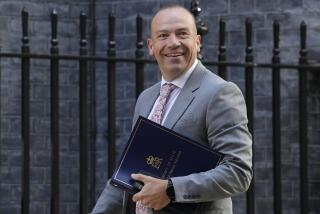Protestant March in N. Ireland Banned
- Share via
LONDON — Tensions rose in Northern Ireland after Protestants were banned Monday from marching--in the ceremonial garb of their Orange Order brotherhood--through a Catholic area next weekend.
Keen to keep a power-sharing peace agreement for the troubled province on track, the British government has already sent an extra 1,000 troops to Northern Ireland to deal with possible violence during the Protestant “marching season.”
The failure of Protestants and Catholics in Portadown, a predominantly pro-British town about 25 miles southwest of Belfast, to agree on a noncontroversial route for Sunday’s planned march led the province’s independent Parades Commission to forbid the Orangemen from passing through the Catholic territory of Garvaghy Road; this, traditionally, has been the last part of a march from the town’s center, north to Dumcree church and back again.
*
For decades, the march wound through farmland and caused no controversies. But starting in the 1960s, the area along the road became Catholic and increasingly hostile.
“We cannot see at this stage how a parade could proceed again this year down the Garvaghy Road without having a serious adverse impact on community relations, both locally and more widely across Northern Ireland,” said Alistair Graham, chairman of the Parades Commission.
Graham said the ruling did not erode the Orangemen’s rights in Portadown.
But furious group members expressed their determination, in a time of rapid political change, to give no ground. They said they will go ahead with their plans until someone stops them. “I think . . . the situation has gone so far that we are now in a fundamental fight for freedom,” said David Jones of Portadown’s Orange Order.
The passions aroused by the “marching season” go to the heart of Northern Ireland’s woes. Protestant unionists see the summer parades, a thanksgiving for receiving land from Prince William of Orange when they settled in the province centuries ago, as a tradition they must retain at all costs. But Catholic nationalists see the marches as a bad reminder of the past and Protestant provocation.
The summer marching season has sparked rioting all over Northern Ireland.
Although the Parade Commission’s ruling has the force of law, the Orange Order has refused any dealings with the body, and there are fears that attempts to reroute the march could provoke wide civil disobedience.
Marjorie “Mo” Mowlam, Britain’s Northern Ireland secretary, said she regretted the failure of the sides to resolve this row but expressed hope that they could still reach a compromise. “This is an indication of failure . . . failure of people to talk, and I regret that,” she said. “However, there are five days left, and I do hope people will try and talk in the days that are left to find a way forward. Violence isn’t the way, and I think the Parades Commission has acted impartially and done their best.”
*
Two battalions of British troops were transferred to the province last week and one arrived earlier this month. Prime Minister Tony Blair’s spokesman said: “There is no point in denying there are security questions that arise from the decision and they will be addressed in the normal way.”
An army spokesman said the extra soldiers had been brought in “as part of a number of prudent and responsible security measures to ensure we remain capable of providing the support required to the Royal Ulster Constabulary during the marching season.”
The possibility of another summer of bitter, damaging confrontation between Catholics and Protestants would put a question mark over Northern Ireland’s tenuous peace deal. In theory, it is on track. Elections last week to a new Belfast Assembly are to be followed Wednesday by the first meeting of the 108-member body.
*
Protestant David Trimble, whose Ulster Unionist Party supports the accord and whose allies won the largest single representation with 30 out of 58 unionist seats, will be named first minister. A pro-agreement Catholic leader from the Social Democratic and Labor Party, which won 24 seats, will become deputy first minister. The Assembly will have real power transferred to it next year.
In practice, though, the champagne is still on ice. Protestant unionists are divided over how far to support the Good Friday accord. Anti-agreement unionists under Ian Paisley won 28 seats. Some members of Trimble’s own party want firm evidence that Sinn Fein, the political wing of the Irish Republican Army, will keep its promise to hand over its weapons.
The British government has put a brave face on Trimble’s smaller-than-expected success, insisting that he has a workable unionist majority.
More to Read
Sign up for Essential California
The most important California stories and recommendations in your inbox every morning.
You may occasionally receive promotional content from the Los Angeles Times.













